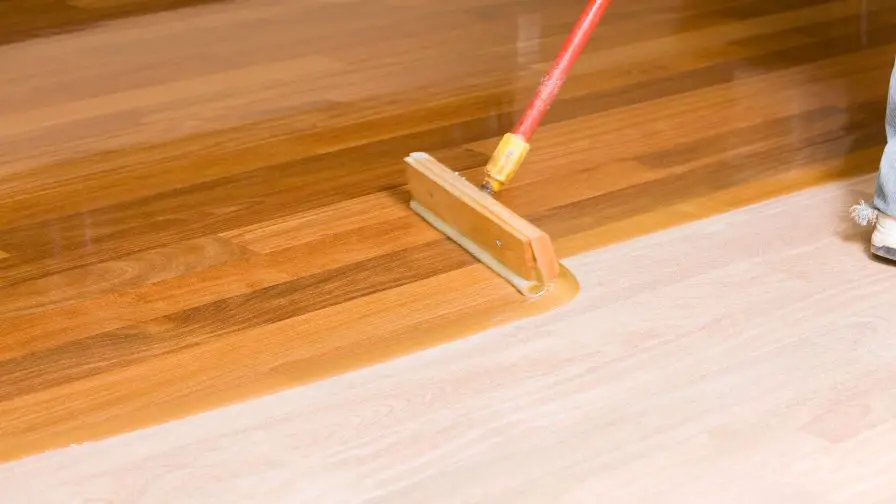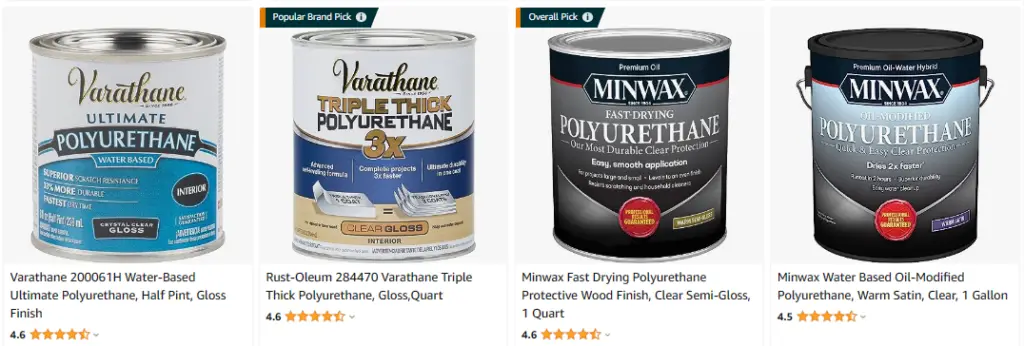
When it comes to flooring, there are many different options to choose from. One of the most popular choices is polyurethane. This type of flooring is known for its durability and high shine. If you are considering installing polyurethane flooring in your home or business, you may be wondering what the best applicator is for the job.
In this blog post, we will discuss the different applicators available and help you decide which one is right for you!

Click Here To Check The Pricing On Amazon
What Is The Best Applicator For Polyurethane On Floors?
A lambswool applicator is the best option to use on floors when applying polyurethane. The lambswool applicator will help to evenly distribute the polyurethane on the floor and will also prevent any streaks from forming. Polyurethane is a tough, durable finish that is applied to floors in order to protect them from scratches, scuffs, and everyday wear and tear. Lambswool applicators are also great for applying polyurethane to other surfaces, such as countertops and tabletops.
Lambswool applicators can be found at most hardware stores or home improvement centers. Be sure to follow the manufacturer’s instructions when using a lambswool applicator on hardwood floors. Polyurethane is a strong finish, so it’s important to apply it evenly and carefully. With proper care, your hardwood floors will be protected for years to come.
US Lambswool 70110 Floor Finish Applicator

Click Here To Check The Price On Amazon
What Is Polyurethane Flooring And Why Is It So Popular?
Polyurethane flooring is one of the most popular types of flooring on the market today. It is often used in both residential and commercial applications. Polyurethane flooring is available in a variety of colors, styles, and textures. It is also very durable and easy to clean.
The reason why Polyurethane is so popular is that it is very versatile. It can be used in a variety of different settings, including:
- Homes
- Businesses
- Schools
- Hospitals
Polyurethane flooring is also very easy to install. In most cases, it can be installed by the homeowner without the need for professional help. This makes it a great option for those who are looking to save money on their flooring project.
What Are The Different Types Of Applicators Available For Polyurethane Flooring Installation?
There are several different types of applicators available for polyurethane flooring installation.
Brushes
Brushes are the most common type of applicator used for applying polyurethane. They’re easy to use and give you good control over the amount of finish you’re applying. But brushes can leave brush marks in the finish, so it’s important to choose the right brush for the job.
Lambswool
Lambswool applicators are one type of brush that’s often used for applying oil-based polyurethane. Lambswool applicators are made from, you guessed it, lambswool. The natural fibers in lambswool make it soft and absorbent, which helps to evenly distribute the finish and minimize brush marks.
Lambswool applicators are best for applying oil-based polyurethane to a hardwood floor. They’re also good for applying a thicker coat of finish like you might need if you’re filling in scratches or repairing the damage.
To use a lambswool applicator, dip it into the can of polyurethane and then apply the finish to the floor in long, even strokes. Work in small sections so that the polyurethane doesn’t have a chance to dry before you’ve had a chance to spread it out.
Sponges
Sponges are another type of applicator that can be used to apply polyurethane. Sponges have the advantage of being able to reach into corners and tight spaces that brushes can’t get to. And like lambswool applicators, sponges help to evenly distribute the finish and minimize brush marks. But sponges can be messy and difficult to control, so they’re not the best choice for every job.
When using a sponge, wet it with water first and then wring it out until it’s damp. Dip the sponge into the can of polyurethane and then apply the finish to the floor in long, even strokes. Work in small sections so that the polyurethane doesn’t have a chance to dry before you’ve had a chance to spread it out.
Rollers
Rollers are another type of applicator that can be used to apply polyurethane. Rollers are quick and easy to use, and they give you a nice, even coat of finish. But like sponges, rollers can be messy and difficult to control.
When using a roller, wet it with water first and then wring it out until it’s damp. Dip the roller into the can of polyurethane and then apply the finish to the floor in long, even strokes. Work in small sections so that the polyurethane doesn’t have a chance to dry before you’ve had a chance to spread it out.
Now that you know the different types of applicators available, you can choose the best one for your project.
How Do You Choose The Right Applicator For Your Project?
Many different applicators can be used to apply polyurethane. Here are some things you should consider when choosing the right applicator for your project:
- The type of floor you are working on: The most important thing to consider when choosing an applicator is the type of floor you are working on. If you have a hardwood floor, you will want to use a roller or a brush. If you have a concrete floor, you will want to use a squeegee.
- The amount of polyurethane you are applying: Another important thing to consider is the amount of polyurethane you are applying. If you are only applying a small amount, you can use a brush or roller. If you are applying a large amount, you will want to use a squeegee.
- The size of the area you are working on: The size of the area you are working on is also important. If you are only working on a small area, you can use a brush or roller. If you are working on a large area, you will want to use a squeegee.
Now that you know the different types of applicators and what to consider when choosing one, you can decide which applicator is best for your project.
How Many Coats Of Poly Should I Put On My Floor?
You should always follow the manufacturer’s instructions when it comes to the number of polyurethane coats to apply to your floors. In general, however, you will want to apply three coats at least. This will ensure that your floors are protected from scratches and other damage. Finally, if you are applying polyurethane to unfinished wood floors, you will need to apply at least four coats of polyurethane. This will protect the wood from moisture and other damage.



